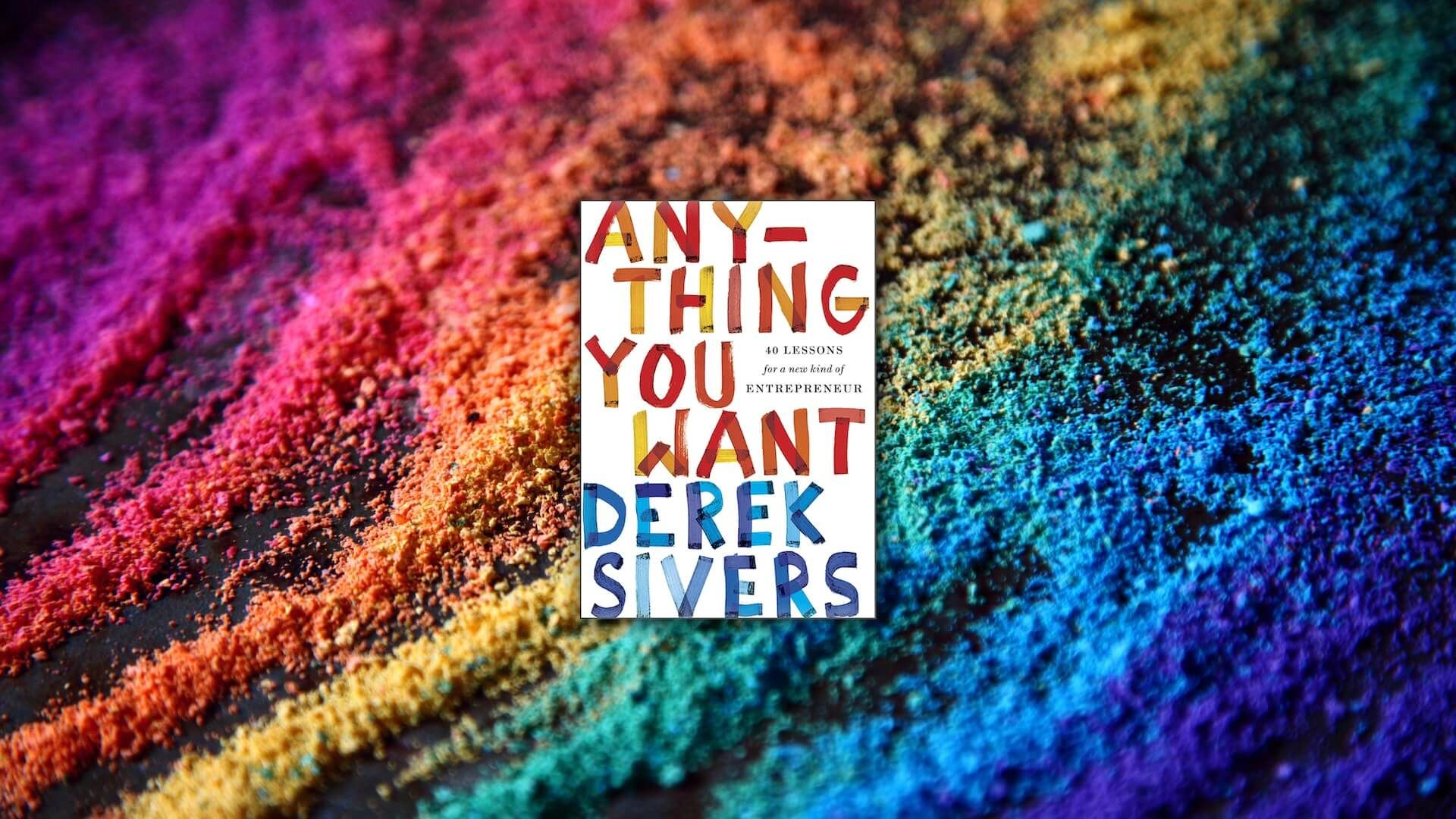I just finished “Anything You Want” by Derek Sivers. It took just a couple of sittings, and it was time well-spent.

It’s a short book that wastes no words. It’s also a delightful book that challenges conventional business thinking and practices. And, for me, it’s a much-needed book that feels like a lighthouse in my stormy mind.[1]
The book challenges me to consider how I want to help people. What can I do that will help solve real people’s real problems?
I wrote more about what I’ve been thinking in this post.
Highlights 🔗
What’s your compass? 🔗
- You need to know your personal philosophy of what makes you happy and what’s worth doing.
- You can’t please everyone, so proudly exclude people.
Make a dream come true 🔗
- The key point is that I wasn’t trying to make a big business. I was just daydreaming about how one little thing would look in a perfect world.
- When you make a business, you get to make a little universe where you control all the laws. This is your utopia.
- When you make it a dream come true for yourself, it’ll be a dream come true for someone else, too.
This ain’t no revolution 🔗
- People think a revolution needs to involve loud provocations, fists in the air, and bloodshed. But if you think true love looks like Romeo and Juliet, you’ll overlook a great relationship that grows slowly. If you think your life’s purpose needs to hit you like a lightning bolt, you’ll overlook the little day-to-day things that fascinate you. If you think revolution needs to feel like war, you’ll overlook the importance of simply serving people better.
When you’re onto something great, it won’t feel like revolution. It’ll feel like uncommon sense.
If it’s not a hit, switch 🔗
- Success comes from persistently improving and inventing, not from persistently doing what’s not working.
Just like that, my plan completely changed 🔗
- Anytime you think you know what your new business will be doing, remember this quote from serial entrepreneur Steve Blank: “No business plan survives first contact with customers.”
The advantage of no funding 🔗
- Never forget that absolutely everything you do is for your customers. Make every decision—even decisions about whether to expand the business, raise money, or promote someone—according to what’s best for your customers. If you’re ever unsure what to prioritize, just ask your customers the open-ended question, “How can I best help you now?” Then focus on satisfying those requests.
Start now. No funding needed. 🔗
- Watch out when anyone (including you) says he wants to do something big, but can’t until he raises money. It usually means the person is more in love with the idea of being big-big-big than with actually doing something useful. For an idea to get big-big-big, it has to be useful. And being useful doesn’t need funding.
Proudly exclude people 🔗
- Have the confidence to know that when your target 1 percent hears you excluding the other 99 percent, the people in that 1 percent will come to you because you’ve shown how much you value them.
“I miss the mob.” 🔗
- Never forget why you’re really doing what you’re doing. Are you helping people? Are they happy? Are you happy? Are you profitable? Isn’t that enough?
How do you grade yourself? 🔗
- How do you grade yourself?
It’s important to know in advance, to make sure you’re staying focused on what’s honestly important to you, instead of doing what others think you should.
Care about your customers more than about yourself 🔗
- Your company should be willing to die for your customers.
That’s the Tao of business: Care about your customers more than about yourself, and you’ll do well.
Act like you don’t need the money 🔗
- When someone’s doing something for love, being generous instead of stingy, trusting instead of fearful, it triggers this law: We want to give to those who give.
Don’t punish everyone for one person’s mistake 🔗
- When one customer wrongs you, remember the hundred thousand who did not. You’re lucky to own your own business. Life is good. You can’t prevent bad things from happening. Learn to shrug. Resist the urge to punish everyone for one person’s mistake.
It’s about being, not having 🔗
-
When you want to learn how to do something yourself, most people won’t understand. They’ll assume the only reason we do anything is to get it done, and doing it yourself is not the most efficient way.
But that’s forgetting about the joy of learning and doing. Yes, it may take longer. Yes, it may be inefficient. Yes, it may even cost you millions of dollars in lost opportunities because your business is growing slower because you’re insisting on doing something yourself. But the whole point of doing anything is because it makes you happy! That’s it! -
When you sign up to run a marathon, you don’t want a taxi to take you to the finish line.
Delegate or die: The self-employment trap 🔗
-
Gather everybody around.
Answer the question and explain the philosophy.
Make sure everyone understands the thought process.
Ask one person to write it in the manual.
Let everybody know they can decide this without me next time. -
There’s a big difference between being self-employed and being a business owner. Being self-employed feels like freedom until you realize that if you take time off, your business crumbles. To be a true business owner, make it so that you could leave for a year, and when you came back, your business would be doing better than when you left.
Make it anything you want 🔗
- Never forget that you can make your role anything you want it to be. Anything you hate to do, someone else loves. So find that person and let her do it.
Trust, but verify 🔗
- Trust, but verify.
Remember it when delegating. You have to do both.
Delegate, but don’t abdicate 🔗
- Delegate, but don’t abdicate.
You make your perfect world 🔗
- Business is as creative as the fine arts. You can be as unconventional, unique, and quirky as you want. A business is a reflection of the creator.
The only persistent thought—it feels like a subconscious mantra—is that I don’t want to do a lot of work, but I do want to do good work that gives me pleasure. ↩︎
